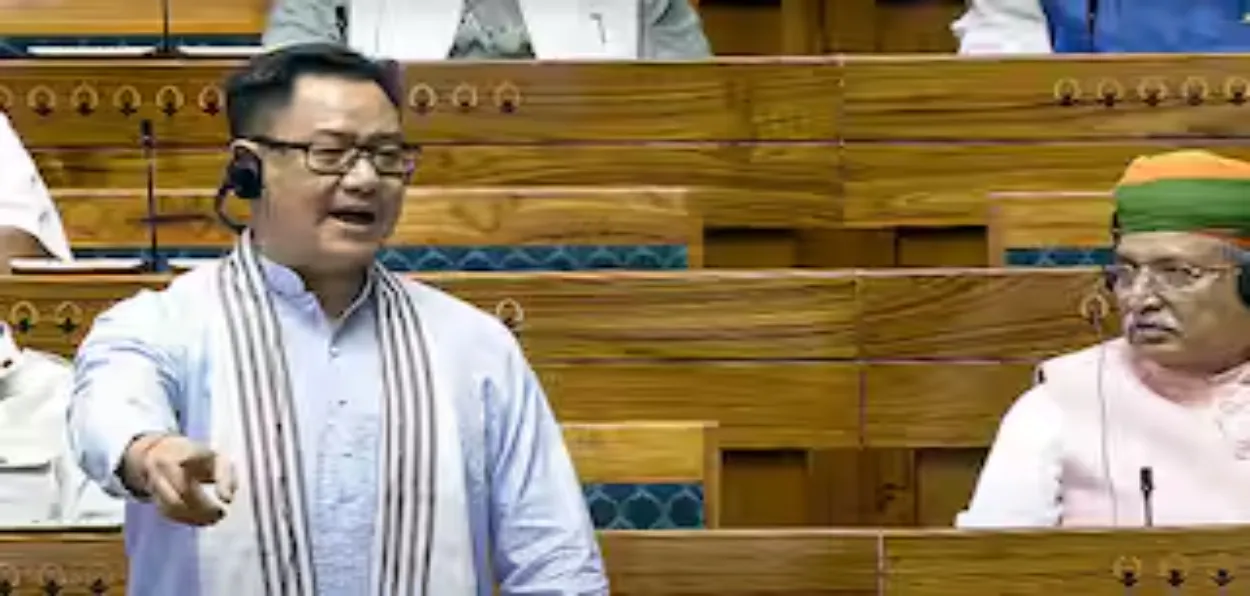
New Delhi
The BJP-led government is slated to introduce the Waqf (Amendment) Bill, 2024 in the Lok Sabha on Thursday to amend the Waqf Act, 1995. The Bill seeks to disempower the Waqf Board of its sweeping powers; bring its holdings under the ambit of regular law and rrules related to property. It also seeks to create separate Waqf Boards for Muslim groups like Bohras, Agakhanis, Shias, etc and make reservations for women and non-Muslims on the governing bodies of these.
Majority of Muslim organization have opposed it though some groups have sought making the management of the Waqf properties more inclusive.
The bill seeks to “effectively address issues” related to the powers of the State Waqf Boards, registration and survey of waqf properties and removal of encroachments.
The Waqf (Amendment) Bill, 2024 is listed for introduction by Minority Affairs Minister Kiren Rijiju in Lok Sabha on Thursday.
The government has decided to withdraw the Waqf Properties (Eviction of Unauthorised Occupants), Bill, 2014 which was introduced in Rajya Sabha in February 2014, when Congress-led UPA government was in power.
Apart from introducing the Waqf (Amendment) Bill, 2024, Rijiju will also introduce The Mussalman Wakf (Repeal) Bill, 2024 which seeks to repeal the Mussalman Wakf Act, 1923.
The Waqf (Amendment) Bill, 2024, Waqf Act provides for the renaming of the Waqf Act, 1995, as the Unified Waqf Management, Empowerment, Efficiency and Development Act, 1995.
It seeks to clearly define “waqf” as waqf by any person practicing Islam for at least five years and having ownership of such property and ensure that creation of Waqf-alal-aulad does not lead to the denial of inheritance rights to women.
It also seeks to omit the provisions relating to the “waqf by user”, provide the functions of the Survey Commissioner to the Collector or any other officer not below the rank of Deputy Collector duly nominated by the Collector for the survey of waqf properties, provide for a broad-based composition of the Central Waqf Council and the State Waqf Boards and ensure representation of Muslim women and non-Muslims.
According to the statement of objects and reasons, the bill seeks to provide for establishment of separate Board of Auqaf for Boharas and Aghakhanis.
It provides for the representation of Shia, Sunni, Bohra, Agakhani and other backward classes among Muslim communities, streamlining the manner of registration of waqfs through a central portal and database and providing for a detailed procedure for mutation as per revenue laws with due notice to all concerned before recording any property as waqf property.
The bill seeks to omit section 40 relating to the powers of Board to decide if a property is waqf property, provide for filing of accounts of waqf by mutawallis to the Board through a central portal for better control over their activities, reform the Tribunal structure with two members and provide for appeals against the orders of the Tribunal to the High Court within a specified period of ninety days.
Sources said that it was decided in the Business Advisory Committee that the Waqf Amendment Bill will be introduced in Lok Sabha on Thursday. Opposition parties are keen that the bill is examined by the standing committee.
The bill proposed that all lands with the Waqf Boards has to behas also introduced the ‘district collector’ in the Act and has given the collector powers to resolve disputes related to the Waqf Act.
The bill gives powers to the district collectors to settle any disputes between the Waqf Board and the government. “If any question arises as to whether any such property is a Government property, the same shall be referred to the Collector having jurisdiction who shall make such inquiry as he deems fit, and determine whether such property is a government property or not and submit his report to the state government,” reads Section 3C of the new bill.
Section 36 of the proposed legilsation says that district collectors will inquire genuineness and correctness of the application and submit a report to the board for any property to be registered as Waqf.
The word ‘Waqf’ in the previous bill, is proposed to be substituted with ‘Unified Waqf Management, Empowerment, Efficiency and Development’ in the previous act that was enacted in 1995.
“Any government property identified or declared as Waqf property, before or after the commencement of this Act, shall not be deemed to be a Waqf property,” reads the new Bill.
he bill intends to streamlining the manner of registration of Waqfs through a central portal and database. A detailed procedure is established for mutation as per revenue laws with due notice to all concerned before recording any property as a Waqf property, it said.
ALSO READ: Mushfika Hussain's love for embroidery became a source of income
The government says that the idea behind the amendment bill is to enhance accountability and transparency in the functioning of Waqf boards and ensure the mandatory inclusion of women in these bodies, acording to reports. This is being done in response to demands from within the Muslim community.
